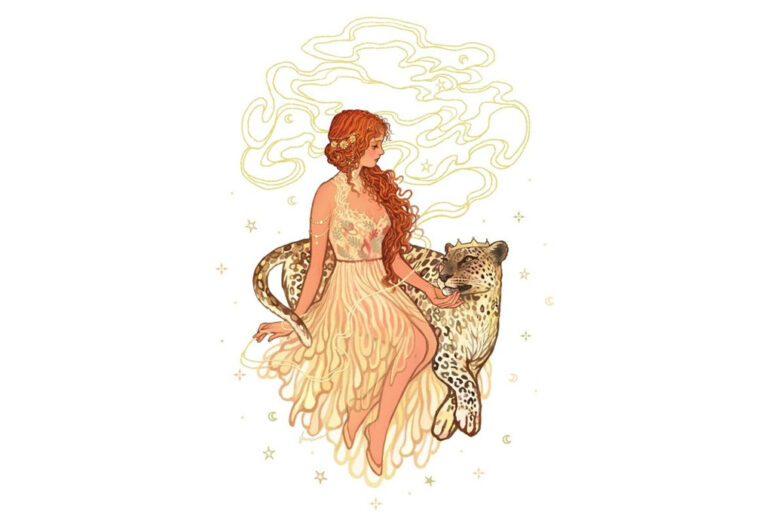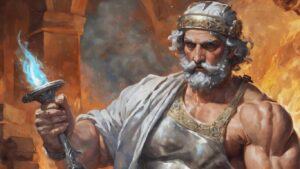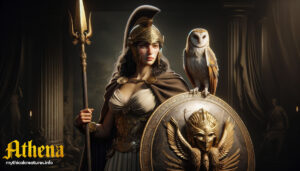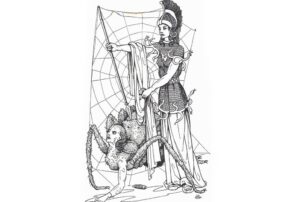Table of Contents
Fast Facts:
Pronunciation: ar-ee-ad-nee
Origin: Greek mythology
Role: Goddess of labyrinths
Parents: Father – Minos, mother – Pasiphae
Consort: Dionysus and/or Theseus
Symbols: Thread, bull, serpent
Who is Ariadne?
Ariadne is a figure in Greek mythology, best known for her role in the myth of the Minotaur and the Labyrinth. According to the myth, King Minos of Crete commissioned the construction of a labyrinth to contain the Minotaur, a monstrous creature with the body of a man and the head of a bull. The labyrinth was a complex maze designed by the inventor Daedalus.
Ariadne played a crucial role in the story. She was the daughter of King Minos and Queen Pasiphae. When the Athenian hero Theseus arrived in Crete to confront the Minotaur, Ariadne fell in love with him. In order to help Theseus navigate the labyrinth and defeat the Minotaur, she provided him with a ball of thread (known as the “thread of Ariadne”). Theseus used the thread to find his way back out of the labyrinth after defeating the Minotaur.
After Theseus succeeded in his quest, he and Ariadne fled from Crete. However, their journey took a tragic turn. In some versions of the myth, Theseus abandoned Ariadne on the island of Naxos, while in others, she died under different circumstances. The fate of Ariadne varies in different accounts of Greek mythology.
Legends and Stories
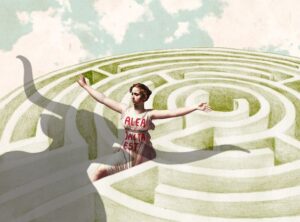
Legends and stories are narratives that often have a mix of historical facts and fictional elements. They are passed down through generations, contributing to the cultural heritage of various societies. Here are a few examples of legends and stories from different cultures:
King Arthur and the Knights of the Round Table (Arthurian Legend):
This legendary tale revolves around King Arthur, a mythical king in medieval England, and his knights. The stories include the sword Excalibur, the Lady of the Lake, the Holy Grail, and the quest for Camelot.
Robin Hood (English Folklore):
The legend of Robin Hood depicts an outlaw who, with his band of Merry Men, robs from the rich and gives to the poor. He is often portrayed as a skilled archer and is a symbol of resistance against tyranny.
The Epic of Gilgamesh (Sumerian Literature):
Considered one of the oldest works of literature, the Epic of Gilgamesh is a Sumerian poem that follows the adventures of Gilgamesh, a historical king of Uruk, and his friend Enkidu. The story explores themes of friendship, mortality, and the quest for immortality.
The Ramayana (Indian Epic):
A significant ancient Indian epic, the Ramayana narrates the life of Prince Rama, his wife Sita, and his loyal companion Hanuman. The epic explores the concepts of duty, righteousness, and the battle between good and evil.
One Thousand and One Nights (Arabian Nights):
This collection of Middle Eastern folk tales includes stories like “Aladdin’s Wonderful Lamp,” “Ali Baba and the Forty Thieves,” and “Sinbad the Sailor.” The tales are framed by the narrative of Scheherazade, who tells stories to the king to delay her execution.
Beowulf (Old English Epic):
Beowulf is an Old English epic poem that tells the story of the hero Beowulf and his battles against the monster Grendel, Grendel’s mother, and a dragon. It is one of the most important works of Old English literature.
The Journey to the West (Chinese Literature):
Also known as “Monkey” or “Monkey King,” this Chinese novel follows the adventures of the Monkey King, Sun Wukong, as he accompanies the Buddhist monk Xuanzang on a journey to retrieve sacred scriptures from India.
Popol Vuh (Mayan Mythology):
The Popol Vuh is a sacred text of the K’iche’ Maya people, recounting the creation of the world, the adventures of the Hero Twins Hunahpu and Xbalanque, and the mythology of the Maya civilization.
These legends and stories often serve as cultural touchstones, reflecting the values, beliefs, and traditions of the societies from which they originate. They continue to captivate audiences and provide insights into the human experience.
Theseus and Dionysus
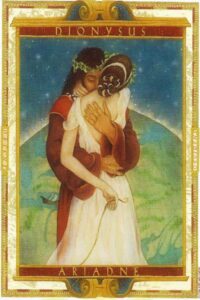
While the stories of Theseus and Dionysus are not directly linked, there is a connection through the character of Ariadne. In some versions of Greek mythology, Ariadne is associated with both Theseus and Dionysus, creating an indirect connection between the two heroes.
Ariadne and Theseus:
Ariadne is best known for her involvement in the story of Theseus and the Minotaur. She helps Theseus navigate the Labyrinth with the thread, enabling him to defeat the Minotaur and escape. Afterward, they flee from Crete together.
The relationship between Theseus and Ariadne takes a tragic turn in some versions of the myth. In certain accounts, Theseus abandons Ariadne on the island of Naxos while she sleeps, either by choice or due to divine intervention. This event varies in different versions of the myth.
Ariadne and Dionysus:
After being abandoned by Theseus, Ariadne is found and comforted by Dionysus, the god of wine and revelry. The god falls in love with Ariadne and makes her his wife. In some versions, Dionysus presents Ariadne with a crown of stars, which is later placed in the night sky as the constellation Corona Borealis.
The union of Dionysus and Ariadne is often portrayed as a happy one, and she becomes one of the immortal goddesses associated with Dionysian cults and celebrations.
So, while the stories of Theseus and Dionysus are separate, Ariadne serves as a connecting figure between them. Her involvement with Theseus in the Minotaur myth and later marriage to Dionysus highlights the interconnected nature of Greek mythology and the complex relationships between its characters.
Ariadne Death
The death of Ariadne is not consistently depicted in Greek mythology, and different versions of the myths provide varying accounts of her fate. In some versions, Ariadne meets a tragic end, while in others, she is immortalized or experiences a more positive outcome.
Abandonment by Theseus:
In the most common version of the story, Ariadne is abandoned by Theseus on the island of Naxos. After their escape from Crete, Theseus and Ariadne stop on the island, but according to some accounts, Theseus leaves her while she sleeps. This abandonment is often considered a cruel act, and Ariadne wakes up to find herself alone.
Rescue and Marriage to Dionysus:
Despite the abandonment by Theseus, Ariadne’s story takes a positive turn in some versions. Dionysus, the god of wine and revelry, comes to Naxos and discovers Ariadne. He falls in love with her and makes her his wife. In this version, Ariadne becomes an immortal goddess associated with Dionysian festivities.
Death and Immortalization:
Some versions of the myth suggest that Ariadne did eventually die, but she was granted immortality or semi-divine status by the gods. In one account, she is placed among the stars as the constellation Corona Borealis, often referred to as Ariadne’s Crown.
The varied and sometimes conflicting nature of Greek mythology allows for different interpretations of Ariadne’s fate. The specific details may depend on the cultural source, the retelling of the myth, and the emphasis placed on different aspects of the story by different storytellers.
Family
Ariadne’s family is rooted in Greek mythology, and her lineage is often associated with significant figures in ancient Greece. Here are key members of Ariadne’s family:
Father – King Minos:
Ariadne is the daughter of King Minos, the legendary ruler of Crete. Minos played a central role in the myth of the Minotaur and the Labyrinth. He commissioned the construction of the Labyrinth to contain the Minotaur, a monstrous creature born of his wife Pasiphae’s union with a bull.
Mother – Queen Pasiphae:
Pasiphae, the wife of King Minos, was Ariadne’s mother. In the myth, Pasiphae falls victim to a curse that causes her to fall in love with a bull, resulting in the birth of the Minotaur.
Half-Brother – The Minotaur:
The Minotaur is Ariadne’s half-brother, born from the unnatural union between Queen Pasiphae and the bull. The Minotaur is a creature with the body of a man and the head of a bull, and it dwells in the Labyrinth constructed by Daedalus.
Lover – Theseus:
Ariadne becomes romantically involved with Theseus, the Athenian hero who comes to Crete to slay the Minotaur. She aids him in navigating the Labyrinth and provides him with the thread that helps him find his way back out. However, depending on the version of the myth, their relationship takes a tragic turn when Theseus abandons Ariadne on the island of Naxos.
Husband – Dionysus:
In some versions of the myth, after being abandoned by Theseus, Ariadne is discovered and comforted by Dionysus, the god of wine and revelry. Dionysus falls in love with Ariadne and makes her his immortal wife, associating her with his cult and festivities.
Ariadne’s family ties are entwined with the complex and often tragic narratives of Greek mythology, showcasing the interplay of gods, mortals, and mythical creatures in ancient Greek storytelling.
Worship

In ancient Greek religion and mythology, worship of the gods and goddesses was a central aspect of daily life. While specific practices could vary across regions and city-states, there were commonalities in the way the ancient Greeks approached their religious rituals and beliefs. Here are some key aspects of worship in ancient Greece:
Polytheism:
Ancient Greek religion was polytheistic, meaning that the Greeks believed in and worshipped a pantheon of many gods and goddesses. Each deity had a specific domain, such as Zeus, the king of the gods, ruling over the sky and thunder, or Athena, the goddess of wisdom and warfare.
Temples and Sanctuaries:
Temples and sanctuaries were sacred spaces dedicated to specific gods or goddesses. These structures served as places of worship, where rituals, ceremonies, and sacrifices took place. Some well-known temples include the Parthenon in Athens, dedicated to Athena, and the Temple of Zeus at Olympia.
Festivals and Celebrations:
The ancient Greeks celebrated numerous festivals throughout the year, each dedicated to different gods and goddesses. These festivals often involved religious ceremonies, processions, feasts, athletic competitions (as seen in the Olympic Games, dedicated to Zeus), and theatrical performances.
Offerings and Sacrifices:
Worship often involved making offerings to the gods. These offerings could include food, drink, incense, and symbolic items. Animal sacrifices were also common, particularly in larger public rituals. The type of offering depended on the deity and the nature of the request or celebration.
Oracle Consultations:
Oracles, such as the famous Oracle at Delphi, were considered channels through which the gods could provide guidance and prophecies. People seeking advice or insight would consult the oracle, and the priestess would deliver cryptic messages believed to be inspired by the gods.
Mystery Cults:
In addition to public worship, there were private and mysterious religious practices known as mystery cults. These cults were devoted to specific gods and goddesses and often involved secret rituals and initiation ceremonies. The Eleusinian Mysteries, dedicated to Demeter and Persephone, are among the most famous mystery cults.
Hymns and Prayers:
Devotees expressed their reverence through hymns and prayers. Poets and lyricists composed hymns dedicated to various deities, and individuals would offer personal prayers for guidance, protection, or blessings.
City-State Patron Deities:
Each city-state often had a patron deity to whom the city was dedicated. For example, Athena was the patron goddess of Athens, while Hera was associated with Argos. The city’s identity and protection were tied to the favor of its patron deity.
Modern Influence
The influence of ancient Greek mythology and culture is pervasive and enduring, shaping various aspects of modern society. Here are some areas where the legacy of ancient Greece continues to have a significant impact:
Language and Literature:
Many words and expressions in modern English and other languages have their roots in ancient Greek. Additionally, numerous literary works, including epics, dramas, and philosophical texts, continue to be studied and referenced in academic and cultural contexts.
Philosophy:
Ancient Greek philosophy, with thinkers such as Socrates, Plato, and Aristotle, laid the groundwork for Western philosophical traditions. Their ideas on ethics, metaphysics, and epistemology continue to influence contemporary philosophy and discussions about knowledge, morality, and existence.
Democratic Principles:
The concept of democracy originated in ancient Greece, notably in Athens. While the structure of ancient Greek democracy differs from modern systems, the idea of citizens participating in governance and decision-making has had a profound impact on the development of modern democratic principles.
Art and Architecture:
Ancient Greek art and architecture, characterized by statues, pottery, and iconic temple structures, have inspired artists and architects throughout history. Neoclassical architecture, which emerged in the 18th century, drew heavily from Greek classical aesthetics.
Medicine and Science:
The Greeks made significant contributions to medicine and science. The Hippocratic Oath, attributed to the ancient Greek physician Hippocrates, remains a foundational ethical guide for medical practitioners. Additionally, ancient Greek scholars like Pythagoras and Euclid made advances in mathematics.
Olympic Games:
The modern Olympic Games, initiated in 1896, were inspired by the ancient Greek tradition of athletic competitions, particularly the ancient Olympic Games held in Olympia. The Olympic flame, the opening ceremony, and the emphasis on athletic excellence all echo elements of the ancient Greek Games.
Literary and Mythological References:
References to Greek mythology abound in literature, art, and popular culture. Myths and characters from Greek literature, such as the Iliad and the Odyssey, are frequently adapted and retold in novels, films, and other media.
Political Philosophy:
The works of political philosophers like Plato and Aristotle continue to influence discussions on governance, justice, and political theory. Ideas such as the social contract and the role of the state in protecting citizens’ rights have roots in ancient Greek political thought.
Drama and Theater:
Greek drama, including tragedies and comedies, introduced foundational concepts to the world of theater. The structure of plays, the use of masks, and the exploration of universal themes are elements that persist in modern dramatic arts.
Education and Academia:
The ancient Greeks valued education and intellectual pursuits. The model of the Academy, established by Plato, has influenced the structure and ideals of modern educational institutions, and the pursuit of knowledge for its own sake is a principle that continues to shape academia.
The impact of ancient Greece on modern civilization is vast and multifaceted, reflecting the enduring relevance of its contributions to philosophy, art, governance, and culture.
Ariadne FAQ
Who is Ariadne?
Ariadne is a figure in Greek mythology. She is best known for her role in the myth of the Minotaur and the Labyrinth. Ariadne was the daughter of King Minos of Crete and Queen Pasiphae. In the myth, she helps the Athenian hero Theseus navigate the Labyrinth, defeat the Minotaur, and find his way back out by providing him with a thread. After their escape from Crete, the fate of Ariadne varies in different versions of the myth. In some versions, she is abandoned by Theseus on the island of Naxos, while in others, she is discovered and married by Dionysus, the god of wine and revelry.
How to pronounce Ariadne?
"Ariadne" is pronounced as "a-ree-AD-nee" with the emphasis on the third syllable, "AD."
How does Ariadne impact Theseus?
Ariadne has a significant impact on Theseus in the myth of the Minotaur and the Labyrinth. Her influence is particularly evident in the following ways:
Assistance in the Labyrinth:
Ariadne plays a crucial role in helping Theseus navigate the complex Labyrinth built by Daedalus to contain the Minotaur. She provides him with a ball of thread, often referred to as the "thread of Ariadne," which allows Theseus to find his way back out of the maze after defeating the Minotaur.
Facilitation of Minotaur's Defeat:
Without Ariadne's guidance and the thread, Theseus might have struggled to navigate the intricate Labyrinth and confront the Minotaur. Her assistance is instrumental in enabling Theseus to successfully carry out his quest to slay the monstrous creature.
Emotional Connection:
In some versions of the myth, Ariadne and Theseus develop a romantic relationship during their time together. The emotional bond between them adds a human element to the myth, creating a connection beyond the practical assistance she provides.
Tragic Abandonment (Some Versions):
In certain versions of the myth, Ariadne's impact on Theseus takes a tragic turn. After their escape from Crete, Theseus abandons Ariadne on the island of Naxos, either as a result of divine intervention or his own decision. This act of abandonment adds a complex and emotional dimension to the story.
Connection to Dionysus (Some Versions):
Following her abandonment, Ariadne's story continues in some versions where she is discovered and comforted by Dionysus, the god of wine and revelry. She becomes his wife, and her connection with Dionysus after the Theseus episode highlights the intertwining of mortal and divine elements in Greek mythology.
Why did theseus leave Ariadne?
The reasons for Theseus leaving Ariadne vary in different versions of the myth, and there is no single definitive explanation. The abandonment of Ariadne by Theseus is a tragic element of the story that adds complexity to the narrative. Here are a few possible reasons or interpretations:
Divine Intervention:
In some versions of the myth, gods or Fates play a role in influencing the events. It is suggested that divine forces, perhaps angered by the actions of Theseus or with a different plan for Ariadne, intervene and cause the abandonment.
Orders from the Gods:
According to one interpretation, the god Dionysus may have had a hand in the abandonment. Some versions of the myth suggest that Dionysus, who later becomes Ariadne's husband, may have instructed or influenced Theseus to leave Ariadne on the island of Naxos.
Alternative Destinies:
Theseus may have believed that Ariadne's destiny was different from his own. His quest was to return to Athens after slaying the Minotaur, and he might have thought that Ariadne had a different path or purpose.
Betrayal or Fear:
Some interpretations suggest more human motivations. Theseus might have felt betrayed by Ariadne, or he could have been afraid of her potential influence or power. Theseus, known for his heroic deeds, may have had personal reasons for leaving.
Change of Heart:
Another possibility is that Theseus simply had a change of heart. His focus might have shifted, or he might have succumbed to the pressures of his journey and the challenges ahead.
What does the name Ariadne mean?
The name Ariadne is of Greek origin and is associated with Greek mythology. The etymology of the name is not entirely clear, but it is often interpreted to mean "most holy" or "utterly pure." The name is derived from the Greek elements "ari-" (meaning "most") and "-adne" (possibly related to "adnos," meaning "holy" or "pure").
In Greek mythology, Ariadne is a significant figure known for her role in helping Theseus navigate the Labyrinth and defeat the Minotaur. The name has a classical and timeless quality, and it continues to be used in various cultures around the world.
Island where Dionysus discovered Ariadne?
The island where Dionysus discovered Ariadne after her abandonment by Theseus is often identified as Naxos. In Greek mythology, after being deserted by Theseus on the island of Naxos, Ariadne is found and comforted by Dionysus, the god of wine and revelry. Dionysus falls in love with Ariadne, and they are eventually married.
This episode is a significant part of the mythological narrative surrounding Ariadne and represents a transition in her story from the mortal realm to the divine, as she becomes associated with the cult of Dionysus. The island of Naxos, in the Aegean Sea, is traditionally linked to this particular event in Greek mythology.
